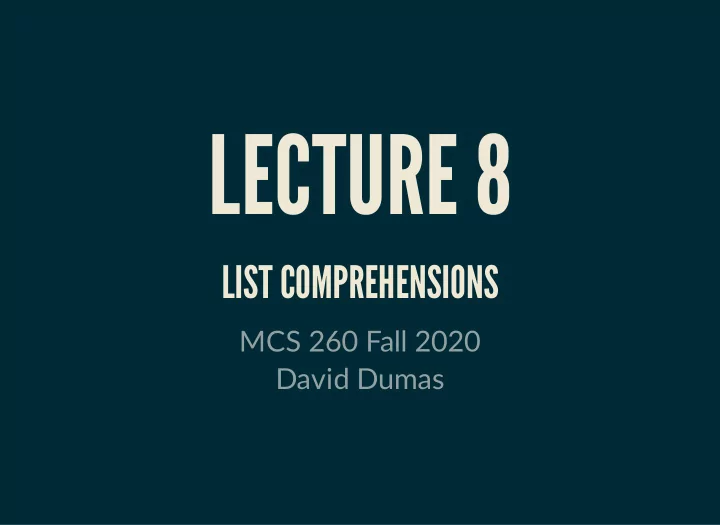

LECTURE 8 LIST COMPREHENSIONS MCS 260 Fall 2020 David Dumas /
REMINDERS Work on: Quiz 3 (due Mon) Project 1 (due Sep 18) and Project 0 Quiz 2 grades posted Today: Worksheet 3 solu�ons /
ITERABLES Last �me we discussed for loops, which run a block of code for each element of a sequence or certain other "container" types. The term for a thing that can appear in a for loop in Python is an iterable . So iterables include: Sequences (strings, lists, tuples) , range(...) enumerate(...) Other built-in types we'll discuss soon (dict, set) /
LIST METHODS Lists in Python have many useful features we haven't talked about. Any list, say , comes with its own set of func�ons L (called methods ) that operate directly on the list. L.append(x) # Add x to the end of the list L.insert(i,x) # Insert x at position i L.remove(x) # Remove first instance of x in L L.pop() # Remove and return the last item of L L.index(x) # Find x in L, return its index All except change the list. index() /
Example: Suppose is a list of strings represen�ng L integers, and we need to convert it to a list of ints. M A for loop can be used to do this: L = ["42", "16", "15", "8", "4"] M = [] for s in L: M.append( int(s) ) # now M == [42, 16, 15, 8, 4] This pa�ern is very common: Iterate over a list, doing something to each element, producing a new list. /
This pa�ern is so common that Python has a more compact way of wri�ng it. The code: M = [] for s in L: M.append( int(s) ) Can instead be wri�en: M = [ int(s) for s in L ] The expression in is called a list comprehension . [ ] A comprehension is a compact way of wri�ng a common type of for loop. /
COMPREHENSION EXAMPLES The basic comprehension syntax is: [ expression for varname in iterable ] For example: [ x**2 for x in range(5) ] # Gives [0, 1, 4, 9, 16] [ s[1:] for s in ["cat", "spot", "blot"] ] # Gives ["at", "pot", "lot"] [ float(s[:-1]) for s in ["6C", "12.5C", "25C"] ] # Gives [6.0, 12.5, 25.0] /
The variable name in a comprehension can be anything, it just needs to be used consistently. These are all equivalent: [ x**2 for x in range(5) ] [ t**2 for t in range(5) ] [ apple**2 for apple in range(5) ] The name in a comprehension is not assigned to anything outside the comprehension: >>> [ x**2 for x in range(5) ] [0, 1, 4, 9, 16] >>> x Traceback (most recent call last): File "<stdin>", line 1, in <module> NameError: name 'x' is not defined /
FILTERING There is another common type of for loop, where elements are not just transformed but also filtered . words = [ "alpha", "bridge", "assemble", "question" ] a_words = [] for s in words: if s[0] == "a": a_words.append(s) # Now a_words is [ "alpha", "assemble" ] This too can be done in a comprehension: a_words = [ s for s in words if s[0]=="a" ] The general form is [ expression for name in iterable if condition ] /
FILTERING EXAMPLES Consider: [ x+x**2 for x in range(5) if x!=2 ] In words: Start with the integers , consider only 0…4 the ones that are not equal to , and for each of those, 2 add the number to its square. Make a list of the results. # range(5) gives [0, 1, 2, 3, 4] # !=2 gives [0, 1, 3, 4] # add to square gives [0+0, 1+1, 3+9, 4+16] # Final result: [0, 2, 12, 20] /
A list of tuples of first and last names: namepairs = [ ("Frances","Beal"), ("David", "Bowie"), ("Justin","Roberts"), ("David", "Cameron") ] Tip: as we do here, list and tuple literals can be split between lines. Inden�ng is not required. What if we want the full names (as first last ) of the people with first name David. [ first+" "+last for first,last in namepairs if first=="David" ] # Gives [ "David Bowie", "David Cameron" ] /
That comprehension, [ first+" "+last for first,last in namepairs if first=="David" ] is almost equivalent to using a for loop: davids = [] for first,last in namepairs: if first=="David": davids.append(first + " " + last) /
Convert every digit from the input string to an int, and make a list of these: [ int(c) for c in input() if c in "0123456789" ] If the keyboard input is , then the above i16 n+0 20B will evaluate to [ 1, 6, 0, 2, 0 ] /
WHEN TO USE COMPREHENSIONS Use when their brevity improves readability, i.e. when a for loop spreads a simple idea out over mul�ple lines. Good for simple processing of a list where you include, exclude, or transform on an element-by element basis. Not suitable when the processing is very complicated, or when you need to exit the implicit for loop early. /
REFERENCES In Downey : Sec�on 19.2 discusses list comprehensions REVISION HISTORY 2020-09-11 Typos fixed 2020-09-10 Ini�al publica�on /
Recommend
More recommend